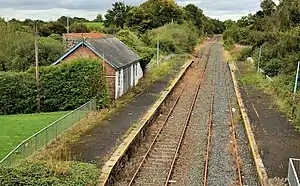Lisburn–Antrim line
The Lisburn–Antrim line is a 20-mile (32 km) railway line of Northern Ireland Railways. It links Knockmore Junction on the Belfast–Newry line with Antrim on the Belfast–Derry line. It has been closed to passenger service since 2003.
| Lisburn to Antrim line | ||||||||||||||||||||||||||||||||||||||||||||||||||||||||||||||||||||||||||||||||||||||||||||||||||||||||||||||||||||||||||||||||||||
|---|---|---|---|---|---|---|---|---|---|---|---|---|---|---|---|---|---|---|---|---|---|---|---|---|---|---|---|---|---|---|---|---|---|---|---|---|---|---|---|---|---|---|---|---|---|---|---|---|---|---|---|---|---|---|---|---|---|---|---|---|---|---|---|---|---|---|---|---|---|---|---|---|---|---|---|---|---|---|---|---|---|---|---|---|---|---|---|---|---|---|---|---|---|---|---|---|---|---|---|---|---|---|---|---|---|---|---|---|---|---|---|---|---|---|---|---|---|---|---|---|---|---|---|---|---|---|---|---|---|---|---|---|
 The closed station at Ballinderry | ||||||||||||||||||||||||||||||||||||||||||||||||||||||||||||||||||||||||||||||||||||||||||||||||||||||||||||||||||||||||||||||||||||
| Overview | ||||||||||||||||||||||||||||||||||||||||||||||||||||||||||||||||||||||||||||||||||||||||||||||||||||||||||||||||||||||||||||||||||||
| Status | Closed to passenger services | |||||||||||||||||||||||||||||||||||||||||||||||||||||||||||||||||||||||||||||||||||||||||||||||||||||||||||||||||||||||||||||||||||
| Locale | Northern Ireland | |||||||||||||||||||||||||||||||||||||||||||||||||||||||||||||||||||||||||||||||||||||||||||||||||||||||||||||||||||||||||||||||||||
| Termini | Lisburn Antrim | |||||||||||||||||||||||||||||||||||||||||||||||||||||||||||||||||||||||||||||||||||||||||||||||||||||||||||||||||||||||||||||||||||
| Stations | 6 prior to closure | |||||||||||||||||||||||||||||||||||||||||||||||||||||||||||||||||||||||||||||||||||||||||||||||||||||||||||||||||||||||||||||||||||
| Service | ||||||||||||||||||||||||||||||||||||||||||||||||||||||||||||||||||||||||||||||||||||||||||||||||||||||||||||||||||||||||||||||||||||
| Type | Commuter rail Regional rail Heavy rail | |||||||||||||||||||||||||||||||||||||||||||||||||||||||||||||||||||||||||||||||||||||||||||||||||||||||||||||||||||||||||||||||||||
| System | NI Railways | |||||||||||||||||||||||||||||||||||||||||||||||||||||||||||||||||||||||||||||||||||||||||||||||||||||||||||||||||||||||||||||||||||
| Services | 1 | |||||||||||||||||||||||||||||||||||||||||||||||||||||||||||||||||||||||||||||||||||||||||||||||||||||||||||||||||||||||||||||||||||
| Operator(s) | NI Railways | |||||||||||||||||||||||||||||||||||||||||||||||||||||||||||||||||||||||||||||||||||||||||||||||||||||||||||||||||||||||||||||||||||
| History | ||||||||||||||||||||||||||||||||||||||||||||||||||||||||||||||||||||||||||||||||||||||||||||||||||||||||||||||||||||||||||||||||||||
| Closed | June 2003 | |||||||||||||||||||||||||||||||||||||||||||||||||||||||||||||||||||||||||||||||||||||||||||||||||||||||||||||||||||||||||||||||||||
| Technical | ||||||||||||||||||||||||||||||||||||||||||||||||||||||||||||||||||||||||||||||||||||||||||||||||||||||||||||||||||||||||||||||||||||
| Number of tracks | Single-track with passing loops. | |||||||||||||||||||||||||||||||||||||||||||||||||||||||||||||||||||||||||||||||||||||||||||||||||||||||||||||||||||||||||||||||||||
| Track gauge | 1,600 mm (5 ft 3 in) Irish gauge | |||||||||||||||||||||||||||||||||||||||||||||||||||||||||||||||||||||||||||||||||||||||||||||||||||||||||||||||||||||||||||||||||||
| Electrification | Un-electrified | |||||||||||||||||||||||||||||||||||||||||||||||||||||||||||||||||||||||||||||||||||||||||||||||||||||||||||||||||||||||||||||||||||
| Operating speed | 70 mph (110 km/h) | |||||||||||||||||||||||||||||||||||||||||||||||||||||||||||||||||||||||||||||||||||||||||||||||||||||||||||||||||||||||||||||||||||
| ||||||||||||||||||||||||||||||||||||||||||||||||||||||||||||||||||||||||||||||||||||||||||||||||||||||||||||||||||||||||||||||||||||
History
The line opened in 1871 as the Dublin and Antrim Junction Railway.[1] The train service on the line was provided by the Ulster Railway until 1876, and by the Ulster Railway's successor the Great Northern Railway thereafter.[2] In 1879 the D&A Junction ceased to be a separate company and was absorbed by the GNR.[2]
Current status
The line is currently closed to passengers after all rail services were withdrawn from the line in June 2003. The stations at Knockmore, Ballinderry, Glenavy and Crumlin have all been closed.
Translink's reason for closing the line was that it was unable to maintain two routes to Antrim economically. The Bleach Green–Antrim line, which had been closed since 1978, was reopened in 2001, providing a faster route between Belfast Central, Antrim and Londonderry. Translink operated a skeleton service on the line, but then gave notice that it would be shut.
The route is still maintained and is used for crew training and train diversions, for example, for passenger services on 9 and 23 October 2011 when there were weekend engineering works at Mossley West. Speculation remains that the line could one day re-open under plans to operate a Belfast — Lisburn — Antrim — Belfast circular route, with the possibility of a station for Belfast International Airport which is close to the line at Aldergrove.
Translink's future plans include re-opening this line, allowing trains from Derry to run once per hour on an alternating pattern between Bleach Green and Knockmore.
In 2012, a section of railway embankment, weakened by weather near Knockmore, gave way as a train was about to pass over. The driver managed to stop and reverse the train away without incident. The embankment has since been repaired.[3][4]
In January 2015, the two passing loops on the line, at Crumlin and Ballinderry, were decommissioned and removed, leaving no more passing points on the line.[5]
On Monday 12 September 2016, the Democratic Unionist Party announced that they would propose a motion to re-open the line as part of an Airport Link. It could mean that services could resume on the line in the near future. It would likely mean that Knockmore would be replaced by the new Lisburn West station at the site of the old SERC building a little further down the line.
On Sunday 10 November 2019, units 3002+3003 worked a radio test train over the NIR network, including the Lisburn to Antrim line with the stations Lisburn West, Ballinderry, Glenavy, Crumlin and Belfast International Airport being included.[6]
Notes
- Hajducki, 1974, pages 5, 9
- Hajducki, 1974, page xiii
- "Passengers escape injury over damaged railway". BBC News. Retrieved 26 September 2012.
- "Rail Accident Report 14/2013: Train ran onto a washed-out embankment near Knockmore, Northern Ireland". RAIB. Retrieved 2 September 2013.
- "NEWS TRANSLINK - NORTHERN IRELAND RAILWAYS". IRRS. February 2015. Archived from the original on 3 October 2015. Retrieved 2 October 2015.
- Rail Express No 284 p96 January 2020 issued 20 December 2019
Bibliography
- Hajducki, S Maxwell (1974). A Railway Atlas of Ireland. Newton Abbot: David & Charles. map 5, map 9, page xiii. ISBN 0-7153-5167-2.